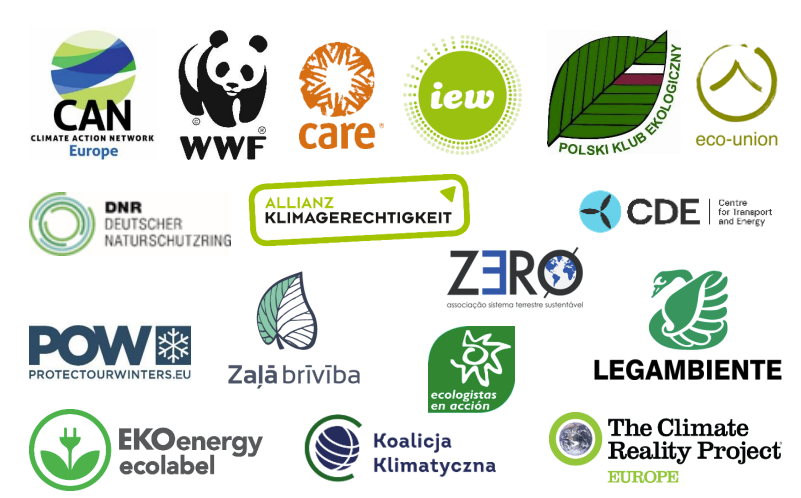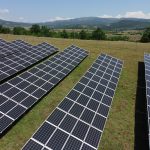To: Ursula von der Leyen, President European Commission
Cc: Frans Timmermans, First Vice President European Commission
17 December 2021
Dear Commission President,
Despite additional commitments made at the recent UN Climate Summit in Glasgow, the world is still
alarmingly off track to limit global temperature rise to 1.5°C. The UN and Climate Action Tracker conclude
that those commitments that have been submitted will only limit global warming to 2.4-2.7°C by the end of
the century, if fully implemented.1
This is why all Parties reconfirmed their commitment to keep the 1.5°C goal in reach and agreed in the
Glasgow Pact to “revisit and strengthen the 2030 targets in their nationally determined contributions as
necessary to align with the Paris Agreement temperature goal by the end of 2022.”2
The commitment applies to all countries, including those that have only recently adopted an increase in
their nationally determined contribution (NDC), such as the EU. The EU has a moral obligation, the ability to
act and a concrete policy opportunity to deliver on those commitments made to the Glasgow package:
- The independent scientific assessment of the Climate Action Tracker (CAT) underlines that the EU’s
current target of achieving -55% net emissions by 2030 is not sufficient to reflect a fair contribution
to the achievement of the 1.5°C goal of the Paris Agreement. - The Glasgow Pact reiterates the principle of common but differentiated responsibilities enshrined
in Article 2 of the Paris Agreement. The EU, as a major historic emitter and high income economy,
thus needs to present above average contributions relative to required global action towards this
objective. - The ongoing deliberations on the implementing legislation at EU-level offer the unique opportunity
to allow the EU to go beyond the net -55% target, by strengthening both the ambition and the
integrity of the package towards the EU’s international commitments. The UN Environment
Programme has called upon G20 countries to reduce their annual emissions by 7.6% between 2020
and 2030 to meet the 1.5°C temperature limit of the Paris Agreement. Applying this annual
reduction target to the EU’s 2019 emissions would reduce the EU’s total emissions in 2030 to 1.569
MtCO2, which is 68% below 1990 levels.3
The Commission should demonstrate its support for the 1.5°C goal by clarifying that this process
enables the EU to go beyond its current NDC and to work with its international partners to equally
commit to increased contributions at COP27 in Egypt next year. It is crucial that the Commission does
not send contradictory signals to its international partners by ruling out an increase of the EU’s NDC,
despite Commission Vice-President Timmermans’ remarks at the closing of COP26 in Glasgow.4
We urge you to stay firm on your commitment to achieve the 1.5°C goal of the Paris Agreement and the
equity principles enshrined therein and to provide clear and consistent signals on the EU’s capacity and
intention to increase its NDC accordingly as promised in the Glasgow Pact.
Yours sincerely,
On behalf of the signatory organisations
Chiara Martinelli
Director, Climate Action Network Europe

1UNFCCC (2021). Nationally determined contributions under the Paris Agreement. Revised note by the
secretariat. https://unfccc.int/documents/307628 and Climate Action Tracker (2021). Warming Projections
Global Update. Global Update – Glasgow’s 2030 credibility gap – Nov 2021 (climateactiontracker.org)
2UNFCCC (2021). Glasgow Climate Pact. https://unfccc.int/sites/default/files/resource/cma2021_L16_adv.pdf
3UNEP (2019). Emissions Gap Report. https://www.unep.org/resources/emissions-gap-report-2019
4European Commission (2021). Frans Timmermans at Stocktaking plenary at COP26: “We need to be able to
say when we meet again in Egypt next year, we’ve done it, we’re on track for 1.5. That was what we need to do
between now and next year. Everyone needs to take their responsibilities. The European Union, we’re doing
our part, our targets are even written into law. So we will be sure to contribute to that. And if we need to do
more, we will be doing more.” https://ec.europa.eu/commission/commissioners/2019-2024/timmermans/announcements/frans-timmermans-stocktaking-plenary-cop26-0_en



